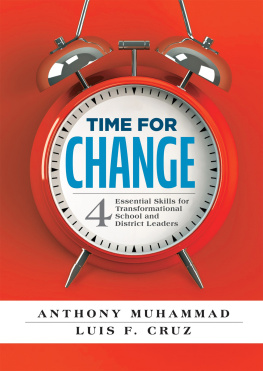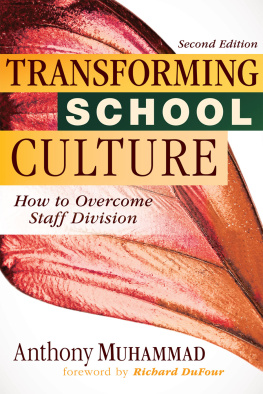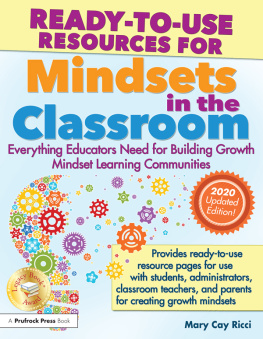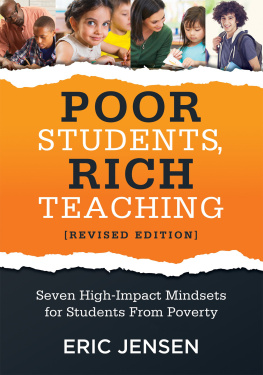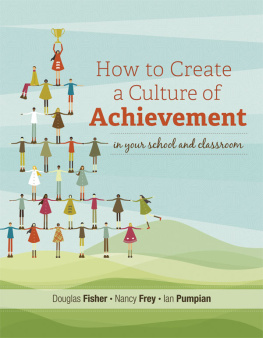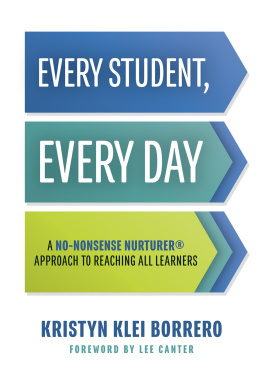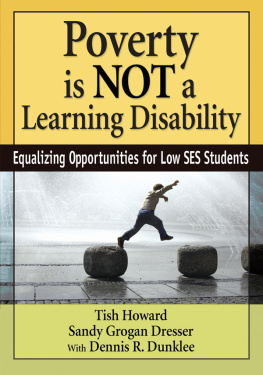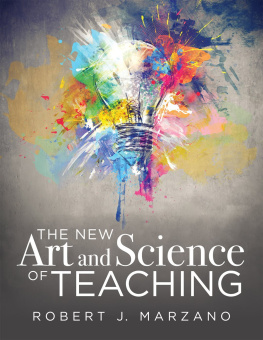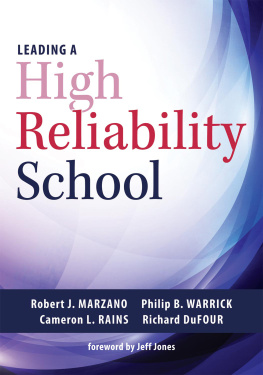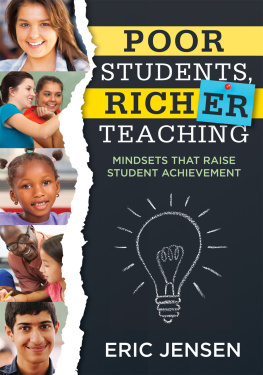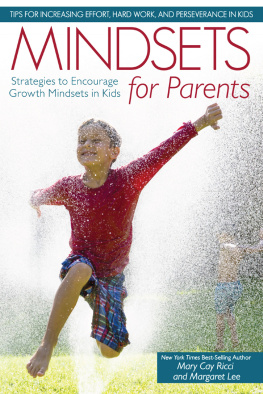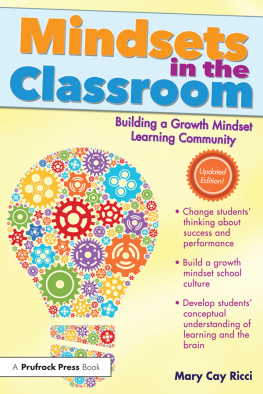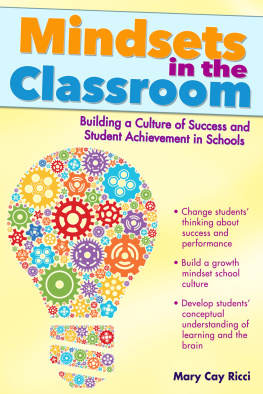OVERCOMING the
Achievement Gap
TRAP
Liberating Mindsets to Effect Change
Anthony Muhammad

Copyright 2015 by Solution Tree Press
Materials appearing here are copyrighted. With one exception, all rights are reserved. Readers may reproduce only those pages marked Reproducible. Otherwise, no part of this book may be reproduced or transmitted in any form or by any means (electronic, photocopying, recording, or otherwise) without prior written permission of the publisher.
555 North Morton Street
Bloomington, IN 47404
800.733.6786 (toll free) / 812.336.7700
FAX: 812.336.7790
email:
solution-tree.com
Visit go.solution-tree.com/leadership to download the reproducibles in this book.
Printed in the United States of America
19 18 17 16 15 1 2 3 4 5

Library of Congress Cataloging-in-Publication Data
Muhammad, Anthony.
Overcoming the achievement gap trap : liberating mindsets to effect change / by Anthony Muhammad.
pages cm
Includes bibliographical references and index.
ISBN 978-1-936763-27-6 (perfect bound) 1. Educational equalization. 2. Academic achievement--Social aspects. I. Title.
LC213.2.M84 2015
379.26--dc23
2015016018
Solution Tree
Jeffrey C. Jones, CEO
Edmund M. Ackerman, President
Solution Tree Press
President: Douglas M. Rife
Associate Acquisitions Editor: Kari Gillesse
Editorial Director: Lesley Bolton
Managing Production Editor: Caroline Weiss
Production Editor: Tara Perkins
Copy Editor: Sarah Payne-Mills
Proofreader: Elisabeth Abrams
Text and Cover Designer: Rian Anderson
Compositor: Abigail Bowen
This book is dedicated to my grandmother and mother.
My grandmother, Emma L. Roberson-Alexander,
departed this world on July 25, 2012, due to
complications from diabetes. She was the rock of
our family and provided the perfect blend of strength
and compassion, so that all of us affected by her love
could grow to become good people. I would also like
to thank my mother, Anna V. Harper-Nelson,
for taking good care of my grandmother during her
period of failing health. Her strength, patience, and
courage were awe-inspiring. These two women made
me the man I am today, and for this reason,
I dedicate this book to them.

Acknowledgments
Solution Tree Press would like to thank the following reviewers:
Leigh T. Barton
Assistant Professor, Educational Leadership
California State University, Fullerton
Fullerton, California
Sam Carter
Principal
Robinson Elementary School
Beloit, Wisconsin
Lena Christiansen
Principal
Daytons Bluff Achievement Plus Elementary
St. Paul, Minnesota
Netty Hull
Assistant Professor of Education
Heritage University
Toppenish, Washington
Louis Lim
Vice Principal
Bayview Secondary School
Richmond Hill, Ontario, Canada
Richard J. Noblett
Principal
Olive Middle School
Baldwin Park, California
Michael C. Rodriguez
Professor, Quantitative Methods in Education
Campbell Leadership Chair in Education and Human Development
University of Minnesota
Minneapolis, Minnesota
Kim Spychalla
Principal
MacArthur Elementary School
Green Bay, Wisconsin
Christopher Wooleyhand
Principal
Richard Henry Lee Elementary School
Glen Burnie, Maryland
Visit go.solution-tree.com/leadership to download the
reproducibles in this book.
Table of Contents
About the Author
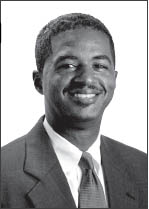
Anthony Muhammad, PhD, is a much sought-after educational consultant. A practitioner for nearly twenty years, he has servedas a middle school teacher, assistant principal, and principal and as a high school principal. His Transforming School Culture approach explores the root causes of staff resistance to change.
Anthonys tenure as a practitioner has earned him several awards as both a teacher and a principal. His most notable accomplishment came as principal of Levey Middle School in Southfield, Michigan, a National School of Excellence, where student proficiency on state assessments more than doubled in five years. Anthony and the staff at Levey used the Professional Learning Communities at Work process for school improvement, and they have been recognized in several videos and articles as a model high-performing PLC.
As a researcher, Anthony has published articles in several publications in both the United States and Canada. He is author of Transforming School Culture: How to Overcome Staff Division and The Will to Lead, the Skill to Teach: Transforming Schools at Every Level and a contributor to The Collaborative Administrator.
To learn more about Anthonys work, visit www.newfrontier21.com , or follow him on Twitter @newfrontier21.
To book Anthony Muhammad for professional development, contact .
Preface
This is the book I always wanted to write. It is the culmination of the work I have done thus far as a practitioner, researcher, consultant, and author. I became an educator because I felt that it was the best way to combat inequality, and I wanted to live in a world where everyone had a fair shot at living his or her dream. So, I started my journey as a classroom teacher, and I loved the experience, but I felt limited in my ability to have influence on a broader scale, since I was restricted to the same 150 students every day. My next adventure was in school administration. I believed that platform would allow me the opportunity to shape an entire institution with my ideas and prove, beyond a shadow of a doubt, that equity could be achieved. I enjoyed that ride for a little more than a decade, and then I discovered that consulting and publishing would provide me with an even broader platform to not just influence one institution but thousands of institutions.
My goal as an author is to shape minds and help create institutions that embrace and achieve high levels of learning for all students. Before pursuing that goal, I believe that school systems and our entire society need to answer a major question: Is equality even possible? This question is essential to address in the struggle to achieve educational equality in schools. Benjamin Bloom (1981), a preeminent educational researcher in American history, states:
After forty years of intensive research on school learning in the United States as well as abroad, my major conclusion is: What any person in the world can learn, )
Bloom (1981) notes that this conclusion does not extend to people with severe cognitive disability or dysfunction, which he identifies as 1 to 3 percent of the population, but it is applicable to the other 97 to 99 percent if they are provided with the right conditions and enough time. Since Blooms research, Robert Marzano (2003), who is often recognized as one of the greatest contemporary educational researchers in the world, concludes that we know enough to close every measurable achievement gap if schools would only seek and utilize the proven strategies. This is clear evidence that when a school is effective, uses the right methods, and creates the right conditions, it is able to develop high-level academic skills in nearly all of its students. So, if learning for all is possible, why do we have an achievement gap?


